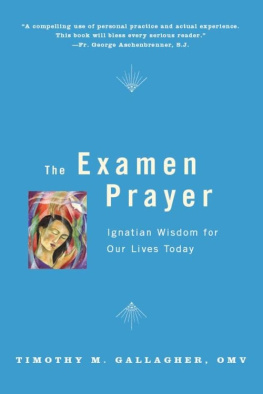ALSO FROM BERNARD SPILKA
The Psychology of Religion, Fourth Edition:
An Empirical Approach
Ralph W. Hood, Jr., Peter C. Hill,
and Bernard Spilka
The
Psychology
ofPrayer

A SCIENTIFIC APPROACH

Bernard Spilka
Kevin L. Ladd

T HE G UILFORD P RESS
New York London
EPUB Edition ISBN: 9781462507146; Kindle Edition ISBN: 9781462507153
2013 The Guilford Press
A Division of Guilford Publications, Inc.
72 Spring Street, New York, NY 10012
www.guilford.com
All rights reserved
No part of this book may be reproduced, translated, stored in a retrieval system, or transmitted, in any form or by any means, electronic, mechanical, photocopying, microfilming, recording, or otherwise, without written permission from the publisher.
Last digit is print number: 9 8 7 6 5 4 3 2 1
Library of Congress Cataloging-in-Publication Data
Spilka, Bernard, 1926
The psychology of prayer : a scientific approach / Bernard Spilka, Kevin L. Ladd.
p. cm.
Includes bibliographical references and index.
ISBN 978-1-4625-0695-8 (hardcover)
1. PrayerPsychology. I. Ladd, Kevin L. II. Title.
BV225.S65 2013
204.3019dc23
2012010301
To Blanka and Hugo Scharlack, my in-laws, for whom prayer was an indispensable part of life
And to their daughter Ellen, my wife of 58 years
B. S.
To my parents, Kay and Kenneth Ladd, who provided
the combination of structure and freedom necessary
to develop a love of learning
K. L. L.
Bernard Spilka, PhD, is Professor Emeritus of Psychology at the University of Denver. He has been president of the Colorado Psychological Association, the Rocky Mountain Psychological Association, and Division 36 (Society for the Psychology of Religion and Spirituality) of the American Psychological Association, and vice president of the Society for the Scientific Study of Religion. Dr. Spilka is a recipient of the Scholar/Teacher Award from the United Methodist Church; the William James Award, Mentoring Award, and Distinguished Service Award from Division 36; and Distinguished Service Awards from the Colorado and Rocky Mountain Psychological Associations. Continuing to write professionally, he is author, coauthor, editor, or coeditor of nine books, one monograph, and two major federal reports.
Kevin L. Ladd, PhD, is Associate Professor of Psychology at Indiana University South Bend and former pastor of United Methodist and Presbyterian (PCUSA) congregations. A consulting editor for journals including the Journal of Social Psychology, Archive for the Psychology of Religion, and Psychology of Religion and Spirituality, he also serves on the Board of Directors of the International Association for the Psychology of Religion. Dr. Ladds research on the psychology of prayer has involved collaborations, publications, and lectures in Africa, China, Europe, India, and South America.
T his is a book on psychology, the psychology of religion, and not religion per se. We discuss people and focus on the psychology of prayer, as we believe it is one of the important, if not the most important, personal religious activities in which one may engage. Prayer is behavior that is intimately associated with the central concerns of mainstream psychology: motivation, cognition, personality, and social psychology. It is therefore of prime interest to psychologists.
To the extent that we address theology and institutional religion, it is in the context of how they influence the beliefs, experiences, thinking, and actions of people. We thus emphasize the prayerful responses that people employ in their desire to identify with, contact, and influence themselves, others, and their God. Some 97% of Americans claim that they pray at least once a week; even some atheists are willing to admit that they too pray (General Social Survey, 2008). Another recent source utilizing earlier Gallup Poll data places the number praying at least once annually at 90% (Delany, Miller, & Bisono, 2007). Something this prevalent obviously possesses great individual and cultural significance.
Psychologists have written about prayer for well over a century. However, it wasnt until the 1980s that we have witnessed a significant amount of systematic objective research in the area. This seems to have increased with each succeeding decade. The one classic effort, by Brown (1994), to provide an overview of this topic has rapidly become outdated because of the remarkable outpouring of published work on the subject.
Our desire is to introduce a scientific psychological approach to what some regard as an inherently unscientific activity. Although we stress the psychological and scientific, it is not possible to embrace a wholly denatured, devalued approach to prayer. Still, our effort accepts theological or inspirational ideas only if they contribute to psychological theory that results in empirical research.
In sum, we aim primarily to show how the study of prayer is integral to the key themes of modern psychology and how crucial it is for scholars to appreciate the multidimensional aspects of prayer and the act of praying. This approach leads to proper recognition of the lifelong developmental expressions of prayer and its significant roles in coping with lifes problems. Controversy is ever present in this endeavor, within both the field of psychology and science in general, and we confront the controversial issues head-on. Given this perspective, we readily identify with Dostoyevskys view, expressed in The Brothers Karamazov, that prayer is an education.
I cannot ever forget Ellen, my wonderful wife of 58 years, whose nudging kept me working on this book every possible moment. I am especially grateful for the skillful help and wonderful attitude of Erin Meyer and her excellent staff at the Penrose Library at the University of Denver. Their ability to locate and obtain references seemed limitless. Michael Nielsen and Michael Donahue were extremely helpful in finding certain source materials that I desperately needed. In sum, aid was available whenever I needed it. Who can ask for more? B. S.
A fair amount of the newest research reported here emanates from the Social Psychology of Religion Laboratory at Indiana University South Bend. This was generously funded by the John Templeton Foundation (Grant No. 12282). I am particularly appreciative of the dedicated efforts of a wonderful research team consisting of Katelyn Andrysiak, Briana Becker, Wanakee Brown, Cara Cook, Jaime Cora, Alyssa Dibley, Kaitlyn Foreman, Melissa Lentine, Angie Meador, Sarah Mertes, Kyle Messick, Alison Niemi, Brice Petgen, Erik Ritter, Carolyn Sherma, Amelia Sinnott, Andrea Stevenson, Erin Tracey, Sheri Vreugdenhil, Kevin Weber, and John Younas. Meleah L. Ladd developed and coauthored many of the presentations. She simultaneously kept project finances well organized. The youngest unofficial members of the teamArryngton, Alasdair, and Aurelia Laddhelped us keep the rest of life in balance. K. L. L.













